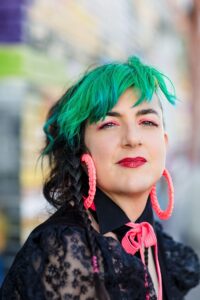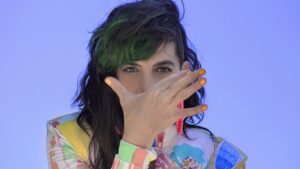A line has formed outside the Post Office Café: some men, but mostly women, many middle-aged, their hair styled into mullets and pixie cuts, their faces framed by fringes and micro-bangs. Their eyes are lined in black and shadowed with other colors; they rest their heads on each other’s shoulders. They’re smiling.

Upstairs, the place is alive with anticipation. The star of the show is here; she’s creeping down the center aisle toward the stage, riding a bedazzled broomstick. It’s Bitch, her face illuminated by her neon-green bangs, her eyes bright and dangerous, a long black braid over her shoulder.
She’s laughing evilly. The lighting is black and green — the whole thing is quintessentially witchy. “Let’s cast some spells, shall we?” she crows.
Onstage now, she’s exchanged her broomstick for an electric violin. The instrument is shiny, black, and shaped like an apple core — a poison apple, thrilling to behold and suggestive of dark magic. Galactic points of light decorate the room now; this is Planet Bitch, where wicked women practice “Bitchcraft.”
“Hey Bitch,” every Wednesday evening at the cabaret, is a one-woman show that combines songs from Bitch’s ninth studio album, Bitchcraft, and stories from her life. The show begins with tales of a childhood spent quietly trying to conform to the patriarchal expectations of Planet Earth. It ends in a new world dedicated to women’s empowerment and liberation.
Bitch, who was born Karen Mould, is vehemently anti-capitalist, but that won’t stop her from selling merch outside after the show. She knows the audience isn’t all gay, but she doesn’t care: “Thanks, gays,” she keeps saying. In her skin-tight bodysuit and billowing cape, she takes up space.
As a child, she never said much. Her mother, who ran a tap-dancing school in the basement of Bitch’s childhood home, called her “big-boned” — not a compliment. Bitch couldn’t dance. She needed glasses. But she could hear just fine. Upstairs in her bedroom, she played the violin for her stuffed animals, a language her parents couldn’t understand, she says. Now, onstage at the Post Office Café, she lifts the instrument to her chin and starts to play.
Bitch seems barely to press her bow into the strings, but the sound explodes out over the audience. The timbre is metallic and cool; auditory effects strangle the ends of notes, crystallize staccato accents, and allow for haunting, layered double- and triple-stops. Echoes fill the room and Bitch plays in harmony with them. She’s grinning as she does.
Bitch lowers the violin, and the show continues: she goes from high school to college, where she meets Animal, a fellow visionary feminist. The two reject the language of the patriarchy. Bitch chooses her new name. She smokes cigarettes and spews poetry. “Boys are out, girls are in,” announces Bitch, with vigor. The audience in the small room cheers.
Bitch and Animal were an unstoppable music-making duo. Together they wrote “Pussy Manifesto,” a song that aims to rebrand the word “pussy” to mean strong and good. The song involves a spirited call and response. It’s fun but doesn’t involve melody, and after the enchanting resonance of the electric violin, it feels a little lackluster.
Behind her, on a screen thus far used to project atmospheric collages, concert footage, Bitch’s high school yearbook photo, and pictures of her family and her childhood self, there appear women, one after the other: Rosa Parks, Britney Spears, Ruby Bridges, Sinead O’Connor, Michelle Obama, Christine Blasey Ford, Billy Jean, Malala.
This is the most somber moment in Bitch’s otherwise manically fun production. Her voice is strong and emphatic, and the audience sits strikingly still. “It’s OK,” she sings. “I know how the man always gets his way.”
Second-wave feminism, a period that lasted from roughly the 1960s to the 1980s and can be characterized by proponents’ homogenization of the fight for women’s rights, downplaying their differences in the name of unity, has most definitely informed the scene.
Today’s intersectional feminism might have discouraged the consolidation of those women on the screen; their stories being too dependent on their circumstances to be compared to one another. As feminist scholar Amia Srinivasan has written, “Thinking about how patriarchal oppression is inflected by race and class — patriarchy doesn’t express itself uniformly, and cannot be understood independently of other systems of oppression — has made feminists reluctant to prescribe universal policies.”
In this part of the show, Bitch’s feminism, perhaps more second-wave than third, seems to aim to be universal: the fact that all are women is enough to justify their appearing there, and she’s singing for all of them and for all of us in the audience who can relate to her lyrics. “I’m an easy target,” she sings. Then, repeated again and again: “At the end of the day I’m still proud.”
Whether the show might ring truer as a personal story of overcoming, focused entirely on Bitch’s journey to a planet of her own design, rather than a ubiquitous anthem meant to empower those women who’ve traveled their own disparate journeys, is a question that might not have an answer.
What’s certain is that the music in “Hey Bitch!” is a triumph. Whenever the violin was tucked away on one side of the stage, I missed it.
At the end of the show, Bitch breaks it down on the fiddle, rough and roaring. Then she performs her song “Pages” from Bitchcraft – a rollicking pop track with an infectiously catchy chorus, vibrant shimmering harmonies, punctuated by refrains on the electric violin.
With her instrument under her chin, Bitch shines. Music is more than a language; it’s a tool for translation. Bitch plays; the audience understands. She doesn’t even have to say it, though she will: “Let pussy manifest and let freedom sing.”

Bitchin’
The event: ‘Hey Bitch! A Musical Journey to Planet Bitch’
The time: Every Wednesday at 8:30 p.m. through Sept. 4
The place: Post Office Café and Cabaret, 303 Commercial St., Provincetown
The cost: $35 at postofficecafecabaret.net



